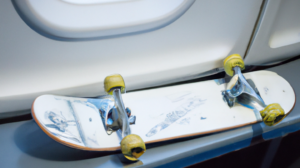Introduction


In the dynamic world of skateboarding, the choice of deck material plays a pivotal role in the overall performance and feel of the board. With the increasing popularity of custom skateboards, enthusiasts and professionals alike are often torn between two prime choices: bamboo skateboards and maple skateboards. As a custom skateboard manufacturer, we understand the importance of making the right choice. This article aims to shed light on the unique properties, advantages, and disadvantages of bamboo and maple decks, helping riders make informed decisions about their custom skateboarding needs.
Basics of Skateboard Decks

A skateboard deck, the flat board you stand on when skateboarding, is the foundation of your ride. Its material composition significantly influences your skateboarding experience, affecting everything from durability and weight to flexibility and pop. Typically, decks are made using either bamboo or maple wood, each bringing unique characteristics to the table. The choice of material is crucial, especially when opting for a custom skateboard tailored to individual preferences and styles.
Understanding Bamboo Skateboards
Bamboo, a rapidly renewable resource, has gained considerable attention in skateboarding. Custom bamboo skateboards are renowned for their lightness and strength.
Advantages of Bamboo
- Flexibility and Strength: Bamboo decks are flexible, offering a unique, responsive ride. Their tensile strength is comparable to steel, making them durable.
- Lightweight: Bamboo’s lightweight nature makes for easy handling and tricks.
- Eco-Friendly: As a sustainable material, bamboo has a lower environmental impact than traditional woods, appealing to eco-conscious riders.
Disadvantages of Bamboo
- Durability Concerns: While strong, bamboo can be prone to splitting over time, especially in rough skating conditions.
- Limited Stiffness: Professional skaters who prefer a stiffer board might find bamboo too flexible.
Understanding Maple Skateboards
Maple has long been the traditional choice for skateboards. Renowned for its rigidity and durability, custom maple skateboards have been the standard in the industry.
Advantages of Maple
- Durability: Maple decks are known for their long-lasting nature and can withstand significant wear and tear.
- Consistency: They offer a consistent feel, which is crucial for professional or competitive skaters.
- Stiffness and Pop: Ideal for tricks, maple decks provide excellent pop and stiffness.
Disadvantages of Maple
- Weight: Maple decks are generally heavier, which can affect maneuverability.
- Environmental Impact: Maplewood takes longer to grow and regenerate, raising environmental concerns.
Comparative Analysis: Bamboo vs Maple
When choosing between bamboo and maple skateboards, understanding their specific attributes about different skating styles and preferences is critical. Here’s how they compare:
Performance
- Bamboo Decks: Offer a smoother ride with more flex, ideal for cruising and carving.
- Maple Decks: Provide better pop and stiffness, preferred for technical tricks and skatepark use.
Durability
- Bamboo: Tends to be resilient but may show wear over time, especially under rigorous skateboarding.
- Maple: Known for its excellent durability, making it a long-term option for frequent skaters.
Environmental Impact
- Bamboo Skateboards: As a sustainable option, they appeal to environmentally conscious riders. Bamboo grows faster, reducing the ecological footprint.
- Maple Skateboards: Though maple cultivation has a higher environmental impact, many skateboard manufacturers are adopting more sustainable practices.
Customization
- Both materials offer excellent customization options. Custom bamboo skateboards are often sought for their unique aesthetic and eco-friendly appeal, while custom maple skateboards are chosen for traditional skateboarding experiences and durability.
Cost
- The cost can vary based on the quality and brand. Still, generally, bamboo decks might be slightly more expensive due to their eco-friendly nature, whereas maple decks are often more affordable.
Environmental Impact
Bamboo’s Eco-Friendly Appeal
- Bamboo skateboards stand out for their green credentials. Bamboo’s rapid growth rate and its ability to regenerate without replanting make it a more sustainable choice. By choosing custom bamboo skateboards, riders contribute to a reduced environmental footprint in the skateboarding industry.
Maple’s Sustainability Efforts
- While traditional maple skateboard manufacturing has faced criticism for its environmental impact, many skateboard manufacturers are now adopting sustainable practices. This includes sourcing wood from responsibly managed forests and reducing waste during manufacturing.
Conclusion
Making an Informed Decision
When deciding between a bamboo or maple skateboard, it’s essential to weigh the pros and cons based on your skateboarding style and environmental preferences. Whether you opt for a custom bamboo skateboard for its eco-friendliness and flexibility or a custom maple skateboard for its durability and classic feel, both materials offer unique benefits.
The Role of Manufacturers
As a custom skateboard manufacturer, we are committed to providing high-quality, sustainable options catering to various skating needs. The choice between bamboo and maple ultimately comes down to personal preference, but regardless of your choice, both materials offer a fantastic skateboarding experience with their distinct qualities.







